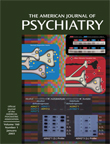Omega-3 Fatty Acid Treatment of Women With Borderline Personality Disorder: A Double-Blind, Placebo-Controlled Pilot Study
Abstract
OBJECTIVE: The purpose of this study was to compare the efficacy of ethyl-eicosapentaenoic acid (E-EPA) and placebo in the treatment of female subjects with borderline personality disorder. METHOD: The authors conducted an 8-week, placebo-controlled, double-blind study of E-EPA in 30 female subjects meeting Revised Diagnostic Interview for Borderlines and DSM-IV criteria for borderline personality disorder. RESULTS: Twenty subjects were randomly assigned to 1 g of E-EPA; 10 subjects were given placebo. Ninety percent of those in both groups completed all 8 weeks of the trial. Analyses that used random-effects regression modeling and controlled for baseline severity showed E-EPA to be superior to placebo in diminishing aggression as well as the severity of depressive symptoms. CONCLUSIONS: The results of this study suggest that E-EPA may be a safe and effective form of monotherapy for women with moderately severe borderline personality disorder.



